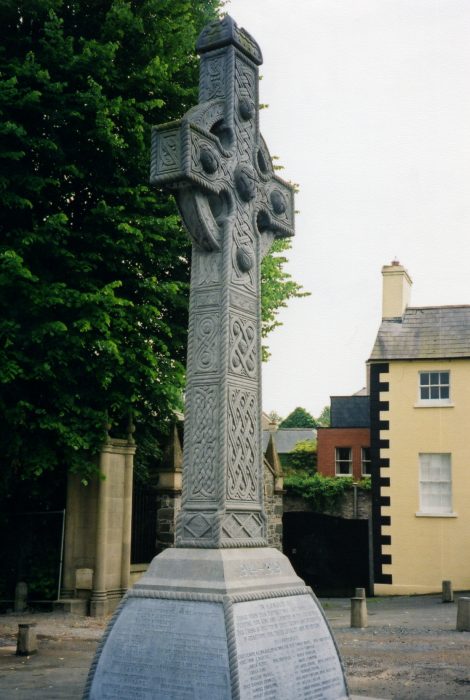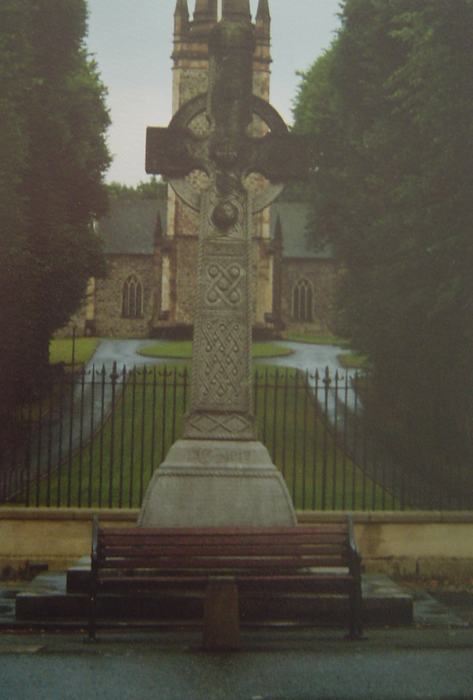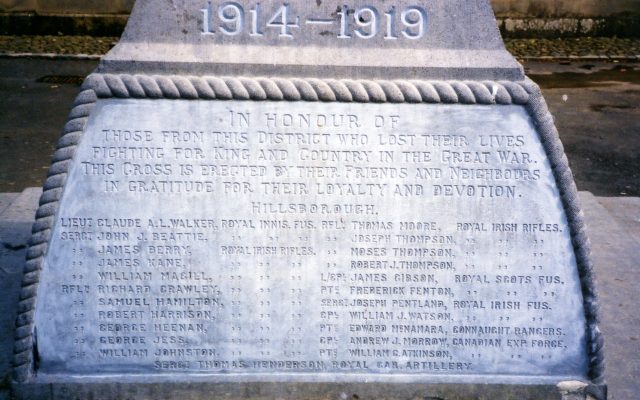

HILLSBOROUGH, Co. Down.
The Fallen 1914 - 1919.
Ralph Adams,
Joseph Alexander,
James Andrews,
William G. Atkinson, Private, Canadian Expeditionary Force.
John J. Beattie, Sergeant, Royal Inniskilling Fusiliers.
James Berry, Sergeant, Royal Irish Rifles.
William J. Berry,
Edward Blain,
Alexander Boyd,
James H. Bryans.
William G. Chambers,
Geo. Chapman,
Albert V. Crangle,
Herbert S. Crangle,
Richard Crawley, Rifleman, Royal Irish Rifles.
Oliver Crossey,
William Crothers.
Thomas Davidson,
Hugh Dempster,
William J. Dorman,
Samuel J. Douglas.
Thomas H. Emerson,
John Faulkner,
Frederick Fenton, Private, Royal Scots Fusiliers.
James Gibson, Lance-Corporal, Royal Scots Fusiliers.
Frederick J. Gillespie,
Victor A. Gillespie,
John W. Gregg.
Edward Hamilton,
Samuel Hamilton, Rifleman, Royal Irish Rifles.
Robert Harrison, Rifleman, Royal Irish Rifles.
George Heenan, Rifleman, Royal Irish Rifles.
Thomas Henderson, Sergeant, Royal Garrison Artillery.
George Jess, Rifleman, Royal Irish Rifles.
Joseph Jess,
William Johnston, Rifleman, Royal Irish Rifles.
James Kane, Sergeant, Royal Irish Rifles.
Samuel Kane.
Henry Lavery,
Stanley Law,
James Lunn.
Samuel J. Macauley,
William Magill, Sergeant, Royal Irish Rifles.
David J. Martin,
Thomas Mercer,
Thomas Moore, Rifleman, Royal Irish Rifles.
Andrew J. Morrow, Corporal, Canadian Expeditionary Force.
John Mulholland,

James C. McCalla,
John McCarthy,
Charles F. McLeavy,
Robert H. McMullen,
Edward McNamara, Corporal Connaught Rangers.
Albert V. Neill,
William Nelson.
Joseph Pentland, Sergeant, Royal Irish Fusiliers.
Thomas H. Philpott.
James H. Scott,
Isaiah Singleton,
Joshua Singleton,
John Smith.
Joseph Thompson, Rifleman, Royal Irish Rifles.
Moses Thompson, Rifleman, Royal Irish Rifles.
Robert J. Thompson, Rifleman, Royal Irish Rifles.
Thomas Thompson,
Henry Toman.
Thomas Verner,
Claude A. L. Walker, Lieutenant, Royal Inniskilling Fusiliers.
Watson, James,
Thomas Watson,
William Watson,
William. J. Watson, Corporal, Royal Irish Fusiliers.
Robert Woods.
1939 - 1945
Cumins Oliver
Downey, Joseph
Ferguson, Edward
Hutchinson, John
McMullan, Thomas
Graham, Thomas
Matchett, Twinem,
Thman, Robert, R. N. (A.B.)
Wilson, William J.
Williamson, Thomas Henry
Wright, John David
McMurry, Desmond

Entirely free of debt, the beautiful Celtic Cross, erected to perpetuate the names for all time of the men from Hillsborough and district who fought and fell in the Great War was unveiled on Saturday afternoon, with simple but deeply impressive ceremonial, the Marquis of Downshire himself pulling the cord that released the Union Jack and allowed it to gentle fold and drop right to the bottom of the base in silent tribute-an Empire’s tribute-to the brave men who so freely gave their lives that England might live.
The memorial has been erected opposite Hillsborough Parish Church, and facing the statue of the fourth Marquis of Downshire. The great-grandfather of the present Marquis and father of Lord Arthur Hill, who presided at the unveiling ceremony.
Every available man, woman, and child in the ancient borough was present. There was no crushing and pushing, and every consideration and sympathy were shown the immediate relatives of the fallen, who, most of them bearing floral wreaths, were allotted a position of honour at the base of the memorial and inside a hollow square which was formed by Ex-Service Men, Church Lads’ Brigade, Boy Scouts, and Girl Guides. It was indeed a pretty setting and worthy in every way of the great occasion.
The memorial is the outcome of an effort inaugurated in 1919. A very representative committee was then formed, with Lord Arthur Hill as chairman and Dr Boyd, J.P., as secretary, and the subscription list was opened with the object of paying some suitable tribute to the heroism of the men who had sacrificed themselves so nobly for King and Country. In a very short time funds began to come in, and ultimately those at the head of the movement were in a position to act upon the suggestions made to them, and place an order for the memorial decided upon.
The site was generously placed at the disposal of the Committee by the Marquis of Downshire, and all who saw the beautiful Celtic Cross unveiled on Saturday afternoon will agree that no more fitting monument could have between selected.
The cross is worked in Irish limestone. The Base weighs about four tons and has four raised panels, which contain the names of the 72 men who made the supreme sacrifice. It is surmounted by a cross about 12 ft. high, with arms 5 ft wide. The whole is artistically carved and is a distinct credit to the contractors Messrs John Robinson & Son, York Street, Belfast.
On three sides of the cross are tablets which bear the names of the fallen. The names are listed under the townland (local district) in which the person lived when enlisting.
The Memorial carries the following inscription: –
IN HONOUR OF THOSE
FROM THIS DISTRICT WHO LOST THEIR LIVES
FIGHTING FOR KING AND COUNTRY
IN THE GREAT WAR.
THIS CROSS IS ERECTED BY THEIR FRIENDS AND NEIGHBOURS
IN GRATITUDE FOR THEIR LOYALTY AND DEVOTION.
A pleasing feature of the unveiling ceremony was the attendance of the famous Hillsborough Castle Guard. The Guard was formed during the reign of Charles II. who gave permission to the then head of the Hill family, his heirs and successors to appoint twenty-six castle wardens, and of these Lord Downshire is the hereditary high-constable. The Guard, which is entirely composed of old residents of the locality was in command of Sgt. Crane, himself an octogenarian. The Ex-Service men of the district were under Capt R. Payne Hatch, the Church Lads’ Brigade under Captain Farnsworth, the Boy Scouts under Scoutmaster Humphrey Jamison, and the Girl Guides under Miss Goldsmith.
Accompanying Lord Arthur Hill on a decorative platform were the Marquis of Downshire, the Lord Bishop of Down and Connor and Dromore (Right Rev Dr Grierson), the Moderator of the General Assembly (Right Rev. Dr Lowe), Rev Francis Matchett, B.D., rector of Hillsborough; and the Rev R. N. Morrison, curate; Major-General A. R. Cameron, C.B.; Brigadier-General Young (Sergeant at Arms of the Northern House of Commons), and Mr O. B. Graham, D.L.; etc.
The proceedings commenced with the singing of, “O God our help in ages past.”
O God, our help in ages past,
Our hope for years to come,
Our shelter from the stormy blast,
And out eternal Home!
Beneath the shadow of Thy Throne
Thy saints have dwelt secure;
Sufficient is Thine arm alone,
And our defence is sure.
Before the hills in order stood,
Or earth received her frame,
From everlasting Thou art God,
To endless years the same.
A thousand ages in thy sight,
Are like an evening gone;
Short as the watch that ends the night
Before the rising sun.
Time, like an ever rolling stream,
Bears all its sons away;
They fly, forgotten, as a dream
Dies at the opening day.
O God, our help in ages past,
Our hope for years to come,
By Thou our guard while troubles last,
And our eternal Home!
The Right Rev W. J. Lowe D.D., Moderator of the General Assembly, then read a passage of-Scripture Psalm 46, versus 1-7;
The Right Rev W. J. Lowe D.D., Moderator of the General Assembly, then read a passage of-Scripture Psalm 46, versus 1-7;
God is our refuge and strength, a very present help in trouble.
Therefore will not we fear, though the earth be removed, and though the mountains be carried into the midst of the sea.
Though the waters thereof roar and be troubled, though the mountains shake with the swelling thereof.
There is a river, the streams whereof shall make glad the city of God, the holy place of tabernacles of the most High.
God is in the midst of her! she shall not be moved; God shall help her, and that right early!
The heathen raged, the kingdoms were moved; He uttered His voice, the earth melted.
The Lord of hosts is with us; the God of Jacob is our refuge.
The Chairman’s Remarks.
The Right Hon. Lord Arthur Hill said that before the actual proceedings were commenced, he should like as treasurer of the fund just to tell them what had been done, what the memorial had cost, and how the subscriptions had come in to meet that cost. After giving the figures in detail his Lordship said that the contract for the memorial was £720, and that morning they still required the sum of £65, 14s 10d to pay off everything. He might tell them that Lord Downshire and Mr O. B. Graham had very kindly contributed £20 each, (hear, hear); he himself had given £5, Dr. Boyd contributed £5, and Dr Willie Boyd £1, and since that the Committee had been kind enough to come forward themselves and subscribe something like £15 to pay off absolutely the whole thing. (Applause.) The result was that the war memorial would be unveiled without one shilling owing on it, and he hoped they would agree with him that that was a satisfactory state of affairs. The Committee had taken a great deal of trouble in connection with the matter, and it was gratifying to know that their efforts had been crowned with such complete success. (Applause.)
The Marquis of Downshire, amid intense silence, unveiled the memorial, after which Mrs Thompson, on behalf of the Committee, placed the first wreath at the base of the Cross. There were few dry eyes during this touching ceremony as everyone in the vast audience knew that of her six stalwart sons who volunteered for service in the war only three returned to her, and but one of the three not maimed or scarred by the wounds of battle. Mrs Thompson was helped down from and up to the platform by the Bishop, and under his Lordship’s encouragingly whispered words bore up bravely under the trying circumstances.
Gallant Soldier’s Tribute.
Colonel W. H. Savage, C.M.G., addressing the gathering, said the beautiful memorial which had just been unveiled by the Marquis of Downshire was a symbol of sacrifice, and the men whose names were recorded on it sacrificed themselves at the call of duty. Duty called them to fight for their King and Country on the land, on the sea, and in the air, in many climes, in heat and in cold, and no men responded to the call in a more glorious fashion than the men of Down.
He had the honour and great good fortune to command the 13th Battalion Royal Irish Rifles-the 1st County of Down Battalion-from the day they were raised at Clandeboye from the Ulster Volunteer Force in September, 1914, to the end of 1916, and he was proud to have the opportunity of adding his word of praise to the men of Down. The Battalion formed part of the 108th Brigade of the 36th Ulster Division, under General Sir Oliver Nugent.
That Division had made history, and no praise, however fulsome, could be too much to record the bravery, the gallantry, and steadfastness of the 13th Royal Irish Rifles, under all circumstances, in the wet and snow of the winter of 1915-16; the cheerfulness and good spirits displayed by all ranks, in spite of the cruel hardships and discomforts, in spite of the monotony of the dayly dreary vigil which seemed so endless, were remarkable. The forms of sacrifice were many. Some fell on the lonely patrol, some singly in the trench, some in numbers in the enthusiasm of an assault, some by the accidental bursting of a bomb, some unexpectedly in the crash of a shell.
Proceeding, Colonel Savage referred to a few of the exploits of the battalion, and paid a tribute to the bravery and devotion to duty of many of the officers and other ranks. Colonel Maxwell, he said, who succeeded him, had written to say how sorry he was that he was unable to be present on that occasion to testify to the splendid services of the men of Hillsborough and district. They all owed much to Colonel Maxwell for his encouragement and advice. He never spared himself, and he was wounded twice.
That monument would remind generations yet to come of the bravery and gallantry of their forebears in the great war, and how they upheld the honour of Down. The memorial was erected to the honour of the glorious dead, but he would like to remind them that they should not forget the disabled soldiers. Theirs was an ever-present sacrifice which must be very hard to bear.
Again, in honouring their fallen heroes they should remember the bravery and patience of the devoted wives, mothers, and close relatives of those whose names were recorded on the memorial, throughout all the weary months of anxiety and trouble. In offering them his great sympathy he hoped, as time softened the blow, they would have the pride of knowing that their boys bravely made a great sacrifice in a great cause.
The Dedication.
The Lord Bishop of Down, then advanced to the base of the Cross, and amid solemn silence, dedicated the memorial-his Lordship said;-We dedicate this Memorial Cross to the glory of God and in loving memory of the men of Hillsborough and surrounding district, who gave their lives in the Great War for God and King and Country. In the name of the Father, and of the Son, and of the Holy Ghost. Amen.
The Lord Bishop having offered up a short prayer, the “Last Post” was sounded by a couple of the buglers of the 1st Battalion Norfolk Regiment.
A local resident, Mrs Thompson, on behalf of the Committee, placed the first wreath at the base of the Cross. Of her six sons who had volunteered for service in the war only three returned to her, two of whom were injured.
The relatives of the fallen having arranged their wreaths at the base of the monument the entire company sang the National Anthem. The pronouncing of the Benediction by the Moderator concluded the touching and inspired Ceremony.
Luncheon at the Castle.
Prior to the unveiling ceremony, the committee and friends, also a number of visitors were entertained in Hillsborough Castle by the Marquis of Downshire who presided. To the right of his Lordship sat the Lord Bishop of the Diocese, Lord Arthur Hill, Lady Dixon, Mr O.B. Graham, Colonel Savage. To his left were the Moderator of the General Assembly (the Right Rev Dr Lowe), Mrs O.B. Graham, Sir Thomas Dixon, Bart., D.L..; Mrs Young, and General Young, C.M.G., D.S.O.
The toast of “The King” given by the Marquis of Downshire having been fittingly honoured, Mr O.B. Graham, on behalf of the company, expressed the high appreciation of the hospitality which had been extended to them by the Marquis of Downshire. He said that he had not only given the finest site about Hillsborough for the erection of the memorial, but had also contributed generously towards the funds.
He had entertained the committee and their friends at the castle that afternoon, and in fact did everything possible that anyone could do to help with the erection of the memorial which they all hoped in some small way would be a recognition of the services by the brave men from Hillsborough and district in the Great War.
At Mr Graham’s request the guests charged their glasses and drank in the heartiest manner the health of the “Marquis of Downshire.”
The wreaths placed on the memorial by Lord Downshire and Lord Arthur Hill, as well as a big percentage of the other beautiful floral tributes, were supplied to order by Mr Thomas Bradshaw, The Gardens, Hillsborough.
The CASTLE GUARD.
A unusual feature of the unveiling ceremony was the attendance of the famous Hillsborough Castle Guard. The Guard was formed during the reign of Charles II, who gave permission to the then head of the Hill family, his heirs and successors to appoint twenty-six castle wardens. The Guard, which is entirely composed of old residents of the locality, was in command of Sgt. Crane, himself an octogenarian.
Lisburn Standard 19th May 1922
If you can supply additional information, photographs of War Memorials in the nine counties of Ulster, or wish to report errors, broken links, make comments, suggestions, requests, etc. please email
uwms@outlook.com
All contributions will be acknowledged.
Research underetaken when time permits.